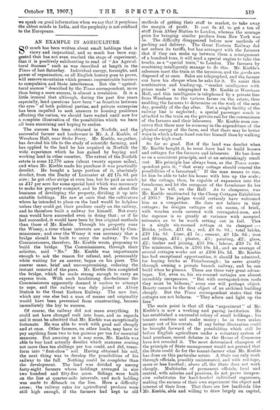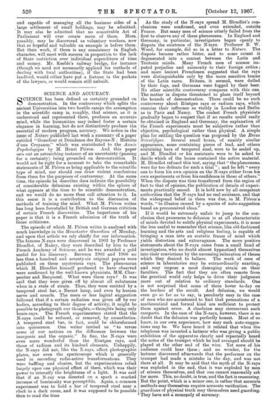AN EXAMPLE IN AGRICULTURE.
0 much has been written about small holdings that is viewy and impractical, and so much has been sug- gested that has not even reached the stage of experiment, that it is positively exhilarating to read of " An Agricul- tural Success" such as was described at length in the Times of last Saturday. Individual energy, foresight, and power of organisation, as all English history goes to prove, will remove mountains which present impenetrable barriers to compulsion and State interference. But the " agricul- tural success " described by the Times correspondent, more than being a mere success, is almost a revelation. It is a little ironical that although, during the past five years especially, land questions have been " as frontlets between the eyes " of both political parties, and private enterprise has been impelled to seek answers to housing problems affecting the nation, we should have waited until now for a complete illustration of the possibilities which we have all been examining and hoping to realise.
The success has been obtained in Norfolk, and the successful farmer and landowner is Mr. A. J. Keeble, of Wereham Hall, near Stoke Ferry. Mr. Keeble, we gather, has devoted his life to the study of scientific farming, and has applied to the land lie has acquired in Norfolk the wide experience which he has gained by buying and working land in other counties. The extent of the Norfolk estate is some 12,770 acres (about twenty square miles), and when Mr. Keeble made his purchase it was practically derelict. He bought a large portion of it, absolutely derelict, from the Duchy of Lancaster at .a 17s. 6d. per acre ; he got other strips at even less, but he paid as much as £17 per acre for some special land which was necessary . to make his property compact, and he then set about the business of developing the property, dividing it up into suitable holdings. He saw at once that the cultivators whom he intended to place on the land would be helpless unless they could get their produce easily on the railway, and he therefore built a railway for himself. Not every man would have succeeded even in doing that ; or if he had succeeded, it would have been by less original methods than those of Mr. Keeble. Through his property runs the Wissey, a river whose interests are guarded by Com- missioners; and over the Wissey it was necessary that a bridge should be built to carry the railway. To the Commissioners, therefore, Mr. Keeble wrote, proposing to build the bridge. The Commissioners, through their solicitor, said " No." Mr. Keeble was importunate enough to ask the reason for refusal, and, presumably while waiting for an answer, began on his piers. The answer came, brief and uncompromising, ordering the instant removal of the piers. Mr. Keeble then completed the bridge, which he made strong enough to carry an express train. With such headstrong disobedience the Commissioners apparently deemed it useless to attempt to cope, and the railway was duly joined at Abbey Station to the Great Eastern Railway. The new line, which any one else but a man of means and originality would have been prevented from constructing, became immediately the key to success.
Of course, the railway did not mean everything. It could not have changed rock into loam, and as regards soil it must be admitted that Mr. Keeble was exceptionally fortunate. He was able to work with good soil cheaply and at once. Other farmers, on other lands, may have to pay anything from two to ten guineas per ton for essential manures. But amazing as it may seem, Mr. Keeble was able to buy land actually derelict which manures costing not more than ten shillings per ton could, and did, trans- form into " first-class " soil. Having obtained his soil, the next thing was to develop the possibilities of his railway to the full. Nothing could be completer than the development. The land was divided up among forty-eight farmers whose holdings averaged in size two hundred and fifty-five acres. Sidings were built on the line at quarter-mile intervals, and each holding was made to debouch on the line. Here a difficulty arose ; the railway rates for agricultural produce were still high enough, if the farmers had kept to old methods of getting their stuff to market, to take away the margin of profit. It cost 8s. 4d. to get a ton of stuff from Abbey Station to London, whereas the average price for bringing similar produce from New York was 5s. The difficulty disappeared before new methods of packing and delivery. The Great Eastern Railway did not reduce its tariffs, but has arranged with the farmers that if they can make up between them a consignment of a hundred tons, it will send a special engine to take the trucks, as a " special train," to London. The farmers by combining intelligently manage to do this. Mr. Keeble's salesmen meet the train at the terminus, and the goods are disposed of at once. Sales are telegraphed, and the farmer can have his cheque when he asks for it. To assist this combination and loading-up, " market intelligence with prices made " is telegraphed to Mr. Keeble at Wereham Hall, and this intelligence is telephoned by a private line from Wereham to the various farms on the estate, thus enabling the farmers to determine on the work of the next. day, possibly of the day after. Not a single facility of the railway line is neglected ; a special passenger coach is attached to the train on the private rail for the convenience of the farmers and their labourers. Mr. Keeble even con- ceives that there may be economy in the expenditure of the physical energy of the farm, and that there may be better ways in which a farm-hand can tire himself than by walking along the high road.
So far so good. But if the land was derelict when Mr. Keeble bought.it, he must have had to build houses and cottages for the farmers and labourers. He has done so on a consistent principle, and at an astonishingly small cost. His principle has always been, as the Times corre- spondent puts it, " that every cottage should conceal the possibilities of a farmstead." If the man means to rise, let him be able to take his house with him up the scale ; lot the cottage, then, be capable of expansion into the • farmhouse, and let the occupant of the farmhouse fix his eyes, if lie will, on the Hall. As to cheapness, was Mr. Keeble unattracted by the Cheap Cottages Exhibition of 1905? The judges would certainly have welcomed him as a competitor. He does not believe in tiny cottages ; he designs cottages of six rooms, of brick, with wooden roofs covered with corrugated-iron, and the expense is so greatly at variance with accepted estimates as to be worth setting out in full. This is a single six-roomed cottage at its cheapest :- Bricks, yellow, £11 6s. ; red, £8 8s. 9d.; total bricks, £ 19 14s. 9d. Lime, £1 5s. ; cement, £9 12s. 8d. ; iron and fittings, £13 ; plaster, £5 ; painting, £2 ; glass, £ 2; timber and joining, £33 10s.; labour, £19 7s. 8d.
The minimum, then, is £105 10s. Id., and an average of several cottages works out at £106 18s. Id. Mr. Keeble has had exceptional opportunities, it should be admitted, for buying bricks at Peterborough ; he saves greatly through owning a private branch railway, and he can build when he pleases. Those are three very great advan- tages. Yet, even so, his six-roomed cottages are almost incredibly inexpensive. "But with corrugated-iron roofs they must be hideous," some one will perhaps object. Beauty cannot be the first object of an architect building cheaply. But the Times correspondent states that the cottages are not hideous. " They adorn and light up the fens."
The main point is that all this " experiment " of Mr. Keeble's is now a working and paving institution. He has established a successful colony of small holdings ; his tenants combine and make money ; he in turn makes money out of his rentals. If any better illustration could be brought forward of the possibilities which still he before English agriculture under a voluntary system of land purchase, recent debates in the House of Commons have not revealed it. The most determined champion of the principle of State management would not pretend that the State could do for the tenant-farmer what Mr. Keeble has done on this particular estate. A State can only work through officials, possibly uninterested, and with red-tape, more or less knotted ; above all, the State does not work cheaply. Multitudes of permanent officials, local and central, with salaries and pensions, do not prove inexpen- sive substitutes for hard-headed individual organisers, making the success of their own experiment the object and interest of their lives. That there are few landlords like Mr. Keeble, able and willing to draw largely on capital, and capable of managing all the business sides of a .large settlement of small holdings, may be admitted. It may also be admitted that no conceivable Act of Parliament will ever create more of them. More, possibly, may be discovered as voluntary workers, now that so hopeful and valuable an example is before them. But their work, if there is any consistency in English character, will meet with success in proportion to the lack of State restriction over individual expenditure of time and money. Mr. Keeble's railway bridge, for instance (though we need not necessarily applaud his methods of dealing with local authorities), if the State had been landlord, would either have put a fortune in the pockets of the lawyers, or would remain still unbuilt.











































 Previous page
Previous page